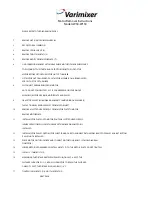
11
CSLD Troubleshooting
CSLD Alarms
11-10
treme thermal expansion due to site specific conditions (i.e. shallow line depth combined with extreme tempera-
tures, etc.).
7. Stage II Vapor Recovery System Related Problems
• Condensed vapors and liquid drawn into the vapor recovery system can leak back into the tank causing in-
creases.
• Check with the manufacturer of the vapor recovery system about possible solutions such as the addition of a
vapor pot to collect these condensed vapors.
• Have the Stage II vapor recovery system inspected and tested.
• Verify that liquid product in the vapor lines cannot drain directly back into the tank. A liquid trap can be in-
stalled. The product that collects in the trap can be siphoned back to the tank via the pump siphon system.
This will prevent the introduction of liquid into the tank during idle periods.
8. Water Leaking into the Tank
• Water can leak into the tank and cause rate increase warnings.
• Check the water level in the tank.
• Monitor the tank for increasing water levels.
• Check the alarm history for prior water level alarms.
ALARM: NO CSLD IDLE TIME
The system has not detected an idle period in the last 24 hours. All tanks must have at the very least some short
idle periods each day. CSLD needs to find an idle time to clear this alarm. This alarm will automatically clear when
the system detects that at least one idle period has occurred (this does not require that a CSLD record get stored
in the rate table).
Frequent or continuous NO CSLD IDLE TIME messages are an indication of a problem. Possible reasons for this
message:
1. Very large leaks may look like a product dispense. If this occurs the system will post a NO CSLD IDLE TIME
alarm since it appears that product is being continually dispensed from the tank. Stop all activities and run a
Static Leak Test.
2. Very high activity. Tank capacity or throughput specifications are exceeding CSLD specifications.
3. Line leak detection is running the product pump during normally idle periods.Veeder-Root line leak equipment is
designed to coordinate line testing and CSLD to prevent this disturbance however in some cases conflicts may
arise.
4. The site may be having problems determining an idle period due to site specific equipment disturbing the tank
level (e.g. vapor recovery equipment).
5. The pump is running continuously. Check for a defective product dispenser or pump relay that is keeping the
pump turned On.
6. A defective probe will sometimes make the tank level appear as though it is changing continuously when it is
actually stable. This can be determined by examining the CSLD Moving Average Table (IA5400 Command).
This table displays the tank data at 30 second intervals. Increases and decreases of typically around 1 or 2
gallons when the tank is idle are indications that the probe may be the problem. Also verify the amount of
samples the TLS is receiving from the probe -there should be at least 7 and as many as 31.
















































